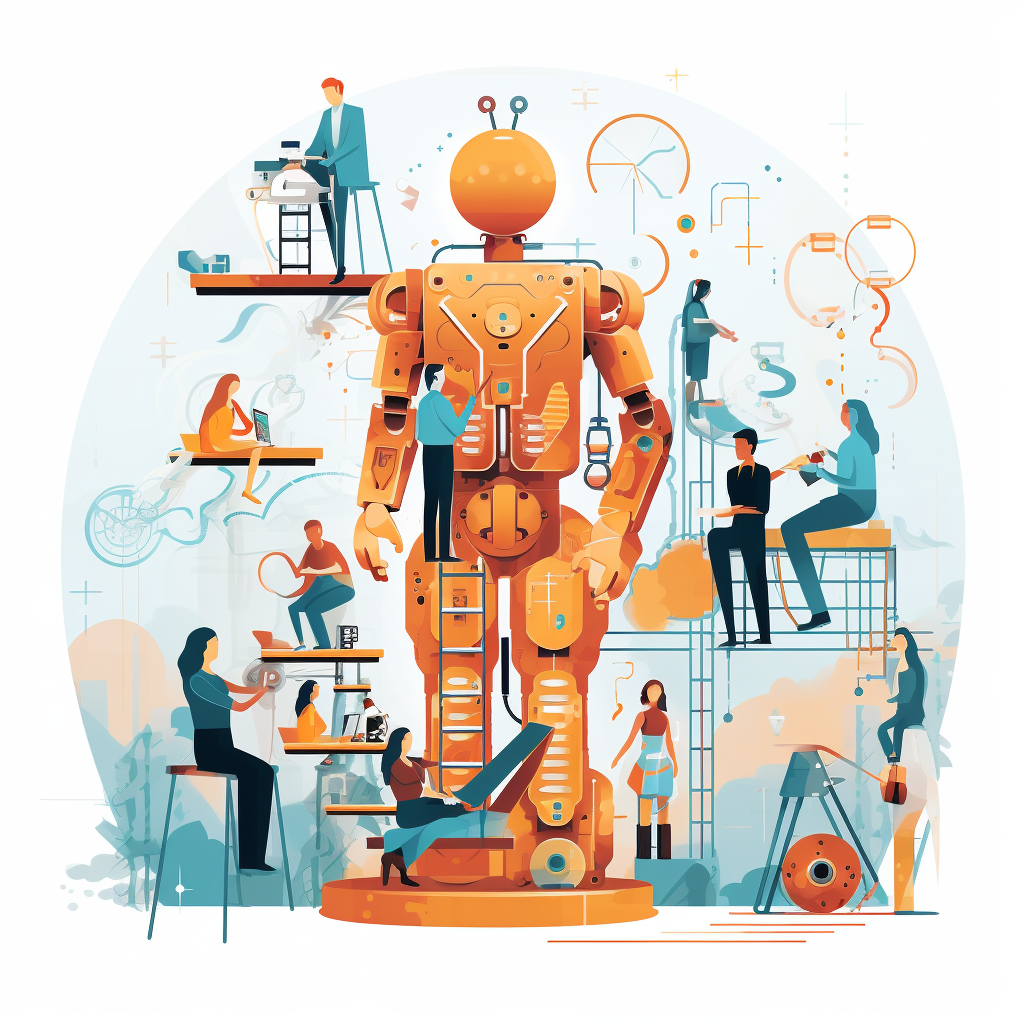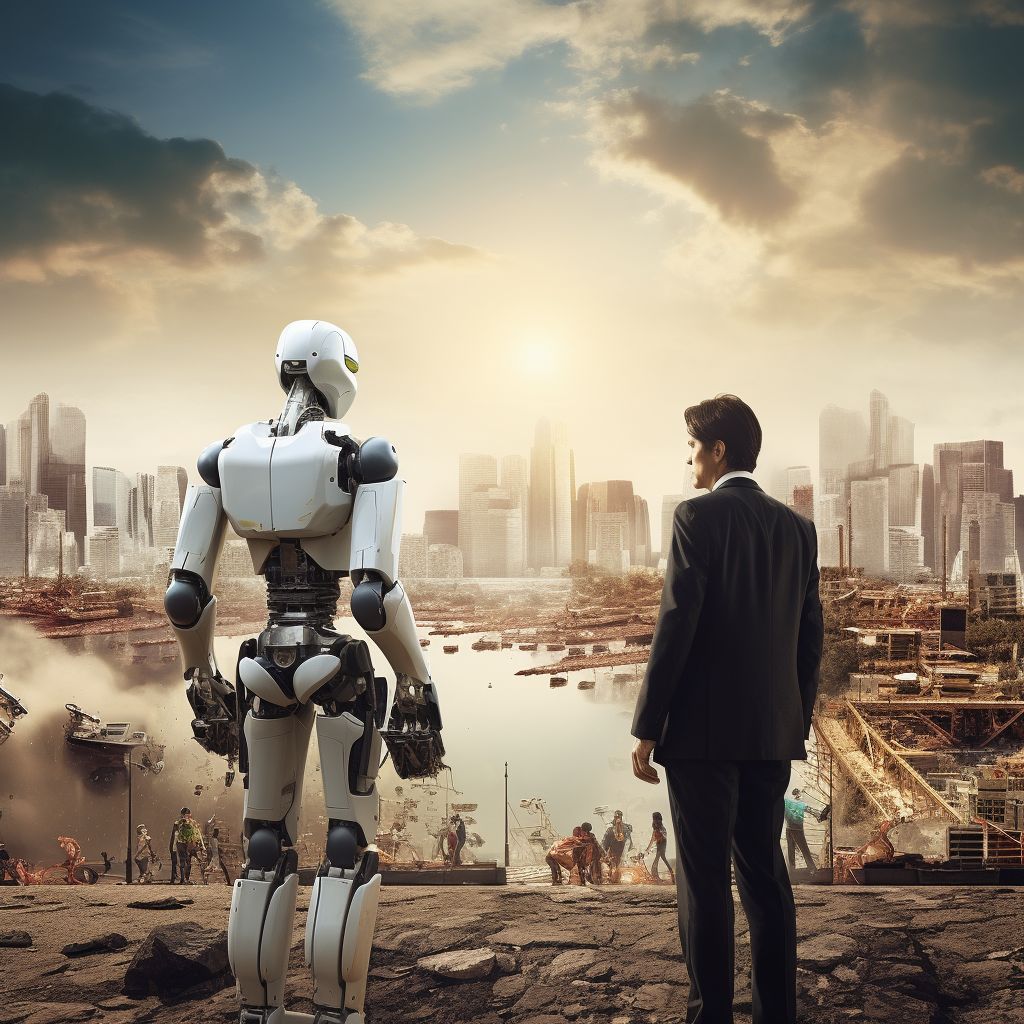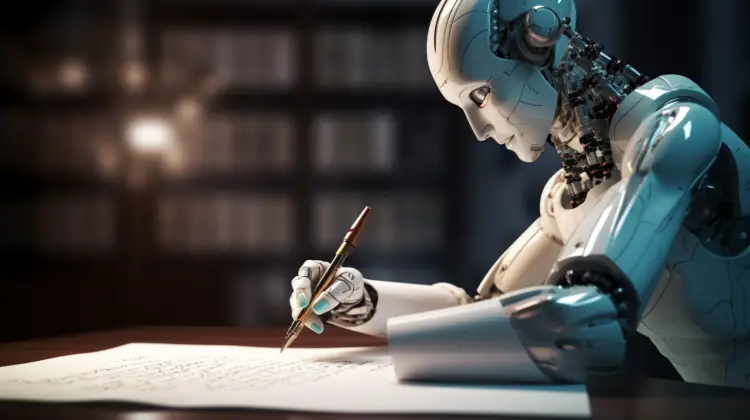A.I. revolution is on the horizon. Imagine a world where copywriters find themselves competing against intelligent machines and voice actors struggling to protect their bread from synthetic voices. In this world, creativity and uniqueness are replaced by algorithms and automated scenarios. As technology advances at an unprecedented rate, our beloved copywriters and voice actors are having to question the future of their careers. Will they be outdated, or will they be able to find a way to drive the digital revolution and prove that humans still have the upper hand over machines? In our search for answers, we embark on a journey through the ever-changing landscape of AI-influenced work, where empathy, realism, and a bit of skepticism come together.
In today’s rapidly transforming world, Artificial Intelligence (A.I.) is revolutionizing industries, and copywriters and voice actors are grappling with the issue of job security. Are the jobs going to be taken by A.I.? The integration of artificial intelligence systems into the creative field has raised concerns about the future of these professions. As A.I. takes on tasks once reserved for human experts, the unique perspectives, creativity, and personal touches offered by professionals are tested. While the potential benefits of increased productivity and productivity are undeniable, the impact on the livelihoods of copywriters and voice actors cannot be ignored. Let’s explore their stories and how the rise of artificial intelligence is reshaping the business landscape and challenging the core of human creativity.
The destruction encountered by copywriters
The introduction of A.I. into the area thrust former copywriter Dean Meadowcroft into the spotlight. The artificial intelligence system, which was initially implemented to facilitate material production, ultimately failed to meet expectations regarding originality and innovation. The final content lacked distinction between brands and made everyone sound the same. Furthermore, human review was essential to ensure the created information was unique. Despite these constraints, the A.I. system’s extraordinary speed of operation led to the layoff of Meadowcroft’s crew, forcing him to face the reality that A.I. had really supplanted their roles.

Uncertain future for voice actors
Voice actor Alejandro Graue saw firsthand the danger artificial intelligence could pose to his industry. While Graue was away, a popular YouTube channel posted a video with an AI-generated voiceover instead of Graue’s original narration. Graue is still worried about the long-term effects on the voice actors, despite the project failing based on audience reaction. As a result of technological progress, professionals like Graue are uncertain about their job security. They are starting to look elsewhere for opportunities.
Quotes: Perspectives from the professionals
As Dean Meadowcroft reflects on the impact of A.I. revolution, he shares his thoughts, “I laughed at the idea of A.I. replacing writers or influencing my work until it did.” This thinking sums up the initial skepticism many professionals had about the potential threats A.I. technology poses. Alejandro Graue wonders about the feasibility of continuing his career in an increasingly automated environment, expressing his concern: “What should I do if this starts happening to every job I have? Should I buy a farm? I don’t know. What other job can I look for in the future that won’t be substituted in the same way? It’s a very complex decision.”
Unequal impact: Job losses and future prospects
Concern and disagreement surround artificial intelligence’s potential to cause mass unemployment. Jobs taken by A.I brings many problems as a sideeffects. A study by Goldman Sachs estimates that 300 million full-time positions are vulnerable to automation. However, not every sector will feel the effects equally. Because of their routine and rule-based character, many professions, such as those in administration and law, are more susceptible to automation. However, businesses that demand manual skills and flexibility, such as construction and maintenance, have a lower automation potential.

The paper notes that while there may be some job losses due to A.I. adoption, there may also be some positive effects on the workforce. A.I.’s ability to automate routine jobs will allow people to devote their time and energy to more challenging and rewarding endeavors. As a result, production may rise, expansion may quicken, and brand-new avenues for profit may open up. Humans and machines should approach A.I. integration with cooperation and flexibility, drawing on each other’s skills and knowledge. This strategy can lessen the economic impact of A.I. adoption in the workplace and pave the way for new opportunities and advancements.
Overcoming challenges: Collaborating with Artificial Intelligence
As the possibility of layoffs looms, there are also avenues for collaboration between humans and A.I. Dean Meadowcroft’s transition to a role as an employee assistance provider exemplifies this approach. By leveraging artificial intelligence to provide rapid access to human-managed content in areas such as mental health and well-being, Meadowcroft sees the future as a combination of human and artificial intelligence capabilities rather than completely eliminating human intervention.
Adapting to a changing landscape
In light of the disruptive nature of A.I., individuals must adopt a mindset of continuous learning and adaptability to remain relevant in the evolving job market. Staying abreast of technological developments and actively seeking opportunities to acquire new skills is becoming crucial to ensure continued employability. As the relationship between humans and A.I. continues to evolve, individuals must proactively embrace change and explore ways to adapt to the changing demands of the workplace.
Navigating the A.I. revolution – embracing collaboration and human creativity
As we reflect on the stories of copywriters and voice actors affected by the rise of A.I., it becomes clear that the future of work lies in collaboration between humans and machines. While it is undeniable that A.I. has the potential to automate certain tasks and streamline processes, it is equally important to recognize the irreplaceable value of human creativity, ingenuity, and emotional intelligence. The challenges facing professionals in these fields are a wake-up call, encouraging us to adapt and embrace new roles that capitalize on our unique skills. By combining the capabilities of A.I. with our own human strengths, we can unlock a new era of innovation and productivity.
As we move forward, it is crucial that individuals, organizations, and policymakers proactively address the impact of A.I. revolution on the labor market. This includes providing pathways for upskilling and retraining, fostering a culture of lifelong learning, and creating opportunities for the human workforce to thrive in an increasingly automated world. Collaboration between industry experts, educators, and technology developers will play a crucial role in shaping a future where human and artificial intelligence coexist harmoniously.

While the future may seem uncertain, we must remember that human connection, empathy, and creativity are deeply rooted in our nature. These qualities cannot be easily replicated by machines. They will continue to be sought after in a variety of industries. By adapting, staying curious, and embracing the opportunities presented by technological advances, we can build a future where humans and A.I. work hand in hand, enriching our lives and advancing in ways we cannot yet imagine.
In this era of transformative change, let’s harness the power of collaboration, using A.I. as a tool to augment our capabilities rather than replace them. The journey ahead may be challenging, but it is also full of enormous potential for growth, innovation, and the realization of our shared aspirations. Together, let us shape a future where humans and machines coexist in harmony, creating a world that thrives on the unique contributions of both.
TAGS: #AIimpact #copywriters #voiceoverartists #automation #contentcreation #changinglandscape #aijobs #aijobtakeover
Source: bbc.com
Disclaimer: The images included in this article are fictional and for illustrative purposes only. These images are computer-generated virtual visuals and do not reflect real-world events or individuals. The use of these images in the article is intended to enhance the storytelling and provide readers with a visual experience. These visuals have been designed to support the narrative of the article and help readers better understand the subject matter. Please note that these images are not based on reality and are purely imaginative. The content and information of the article are based on the sources mentioned in the text.





